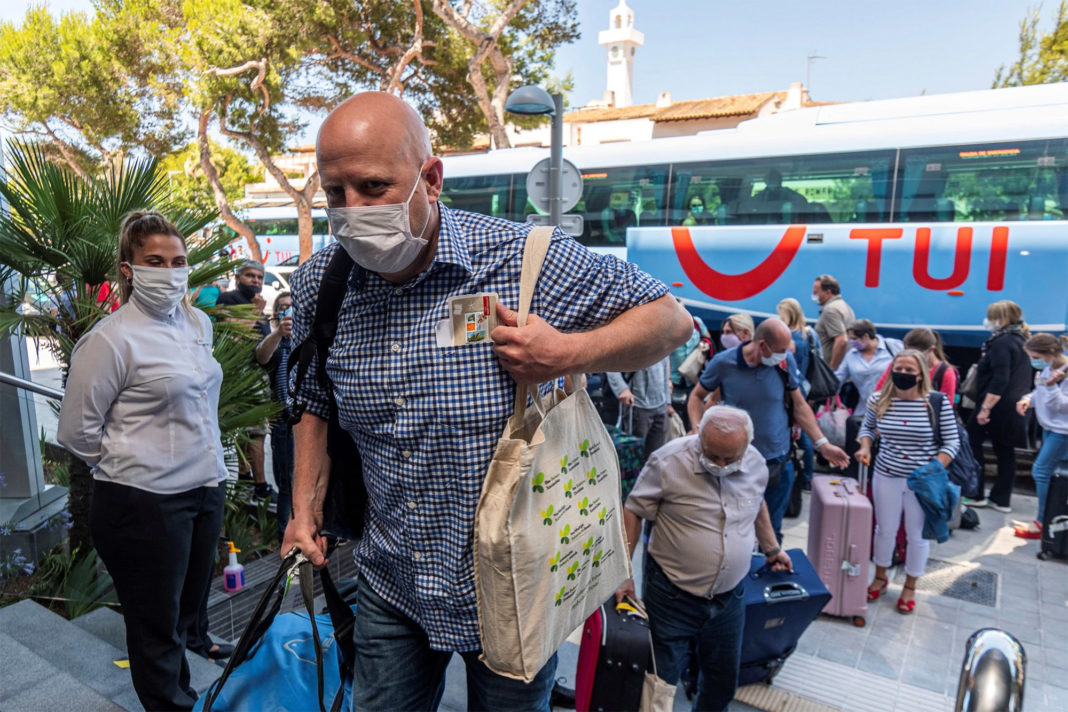At a time of Covid-19 killing over 27,000 people in Spain and infecting more than 290,000 – during May 11 and June 11 – thousands of German holidaymakers have now arrived in the Balearic islands.
As phase 3 of lockdown restrictions come into play a pilot scheme, in a bid to see Spain kick-start its tourism sector – amid the Covid-19 pandemic – a safe tourist corridors initiative is now underway, as a trial run.
Spain re-opens its borders to EU countries and those in the Schengen area on 21 June. The Portuguese land border with Spain will not open until July 1.
Approximately 10,000 German tourists were scheduled to arrive – on 47 separate flights – starting on June 15 in Mallorca; with eight flights to Ibiza and one to Menorca.
Under the scheme, the German tourists do not need to be tested for the coronavirus, and will also be exempt from the mandatory 14 days quarantine period.
They will have to fill out a public health form, have their temperature taken on arrival at the airport, and give the authorities their contact details and address of accommodation.
If they develop any COVID-19 symptoms a team will be dispatched to where they are staying to carry out a PCR test.
Health authorities will also keep in touch with the tourists, via their mobiles.
Francina Armengol, the regional president, described the scheme as an important step in helping to restore the Balearics’s reputation as a safe, quality destination.
The regional government said German tourists had been chosen for the scheme – because Germany is the country that sends the most visitors to the archipelago – and Germany’s health situation was similar to that of the islands.
“We’re in a similar epidemiological situation to Germany, but that isn’t the case with the UK,” said Iago Negueruela, head of the Balearics’ tourism department. “With Germany we are negotiating within EU conditions and the Schengen zone – which is not the case with the UK,” said Negueruela.
The Canary islands are piloting a similar scheme to welcome 9,300 Germans during the second half of June, but authorities there want visitors to be tested for the virus.
“It’s the most reliable system for minimising risk,” a regional government source told Reuters.
They said it had yet to be decided whether testing would be done – before travel or on arrival. The plan is still awaiting permission from the central government in Madrid.
The Spanish government said the trial run could yield lessons that could be learned across other parts of the country.
“Pilot programmes involving safe tourist corridors are being undertaken before the state of emergency ends, to see how the model for the lifting of temporary controls on internal borders and the return to freedom of movement is working.
“This will afford us the necessary guarantees when it comes to tracking, identifying and isolating possible Covid-19 cases among a far smaller group of tourists than is likely to arrive subsequently,” said a government spokesperson.
Spain had been due to delay the re-opening of its borders to other EU countries until July 1. But on June 14, Prime Minister, Pedro Sánchez, announced they would open a week earlier and that the 14-day quarantine requirement for those entering the country from overseas would also expire on June 21.
Spain will open its borders to so-called third countries, which are not part of the Schengen area, from July 1 – providing their epidemiological situation is similar to, or better than that of the EU, that they show reciprocity when it comes to travel, and that they agree to certain health conditions.
At the beginning of June, Spain’s tourism minister, María Reyes Maroto, said the country’s message to UK tourists, its largest single national visitor group: “As soon as possible, we want British tourists to come back as soon as they can.
“We’re in touch with British authorities and tour operators, regarding two elements that need to be resolved.
“One is the possible quarantine that the British government has announced. We know that there are pressures from the sector and that it could be taken off the agenda, but what’s really limiting movement right now are the restrictions from the Foreign Office.”
From June 15, over 70% of Spain will be in the final phase of lockdown exit. The Madrid region and the Barcelona metropolitan area, two of the hardest-hit areas, will remain in the penultimate phase, along with parts of the Castilla y Léon region and the Catalan province of Lleida.






